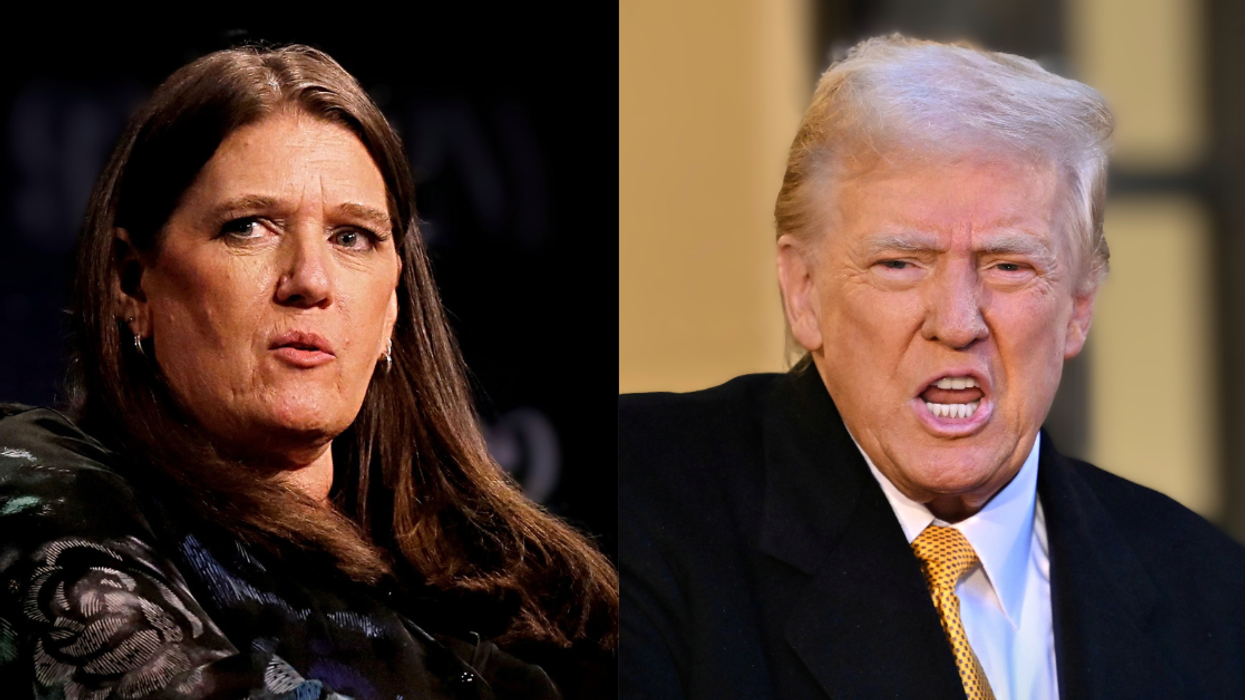In an appearance on NBC's Meet The Press on Sunday, Republican President-elect Donald Trump announced several of his priorities for when he takes office.
He promised to start mass deportation efforts, impose tariffs, pardon his MAGA minions convicted for the January 6 Capitol riot that resulted in at least five deaths, injuries to over 150 members of law enforcement, and millions of dollars in damages, and weaponize the Justice Department against those who investigated the attack.
Another area Trump vowed to make a high priority on day one is eliminating birthright citizenship via executive order.
Trump toldMeet The Press host Kristen Welker:
"We have to end it. We're going to end that because it's ridiculous."
Then he falsely claimed:
"We’re the only country that has it, you know."
In response, many were quick to point out four of Trump's five children were born in the United States to mothers who weren't United States citizens at the time of their birth.
However, since Donald Trump was a United States citizen at the time of their birth, all of his children would be citizens due to both their place of birth and their father's citizenship.
Instead, four of his five children were so-called anchor babies for their non-citizen mothers just as two of Donald Trump's siblings were anchor babies for his own Scottish-born mother. All three women eventually became United States citizens.

While Donald's children would not be affected by an end to birthright citizenship, his father would have been. A fact pointed out by Trump's niece, Mary Trump.
Speaking on MSNBC, Mary Trump said:
"He's a deeply ignorant, cruel man who seems to forget that his father was a first-generation American."
"If it hadn't been for birthright citizenship, my grandfather probably wouldn't have been allowed to stay here."
You can watch the moment here:
Mary Trump added:
"What [Donald Trump] also doesn't understand is the reason why we have the 14th Amendment was because we enslaved an entire race of people."
"[It is] another instance in which we are in the unfortunate position of having to rely on Republicans to do the right thing and protect American citizens."
Both of Donald Trump's paternal grandparents were German-born.
But when their son Frederick Trump—Donald's father—was born, he became a United States citizen through birthright citizenship.
People—including former Secretary of State Hillary Clinton—were unsurprised by the President-elect's hypocrisy and ignorance.
During his disastrous interview with Kristen Welker, Trump said no other country has birthright citizenship, and Welker did not challenge it. For what it's worth, dozens of countries have birthright citizenship
— David Pakman (@davidpakman.bsky.social) December 8, 2024 at 7:56 PM

I’m a U.S. citizen thanks to birthright citizenship. My parents legally immigrated from Colombia. Ending birthright citizenship is Trump’s way to target people of color who oppose him. He wants to make legal immigration impossible unless you’re a wealthy Trump supporter.
[image or embed]
— Leia🌻 (@theswprincess.bsky.social) December 8, 2024 at 10:38 AM
"Trump Lays Out Agenda in Extended Interview" Alt headline: Trump promises extremist agenda in extended interview. President-elect wants to jail Jan 6th committee; pardon Jan 6th domestic terrorists, deport entire families & end birthright citizenship. www.nytimes.com/live/2024/12...
[image or embed]
— @NewsJennifer (Jennifer Schulze) (@newsjennifer.bsky.social) December 8, 2024 at 11:51 AM

Trump wants to end birthright citizenship through executive order and plans to deport entire families even if children are citizens. 1. Birthright citizenship is Constitutional - Trump can challenge it in court, but CANNOT end it via EOs. 2. He can't deport legitimate citizens if they want to stay.
— Tirah Att (@tirahatt.bsky.social) December 8, 2024 at 10:36 AM
The United States and at least 93 other countries have birthright citizenship. Under this provision, children are granted citizenship upon birth in two forms: ancestry-based and birthplace-based.
As outlined by the American Immigration Council, the U.S. employs a combination of:
- unrestricted birthplace-based citizenship for anyone born on U.S. soil, regardless of their parents' citizenship status
- restricted ancestry-based citizenship for children born abroad to U.S. citizens
The 14th Amendment of the United States Constitution grants birthright citizenship to "all persons born or naturalized in the United States, and subject to the jurisdiction thereof, are citizens of the United States and of the state wherein they reside."
Birthplace-based citizenship—or jus soli, the Latin legal term meaning "right of the soil"—grants citizenship to those born in the United States, in one of the territories of the USA, or on land designated as U.S. soil—such as military bases and embassies located in foreign countries.
Ancestry-based citizenship—jus sanguinis or "right of blood"—confers citizenship on any baby born of a parent that holds U.S. citizenship.
While future Presidents can reverse executive orders from prior administrations, amending the Constitution requires extraordinary consensus: two-thirds majority in Congress plus ratification by 38 state legislatures.








 @PreetBharara/X
@PreetBharara/X @RepBrendanBoyle/X
@RepBrendanBoyle/X @twesq/Bluesky
@twesq/Bluesky @christopherharris/Bluesky
@christopherharris/Bluesky @evangelinewarren/X
@evangelinewarren/X






 @FrankC164/X
@FrankC164/X
 AMC
AMC